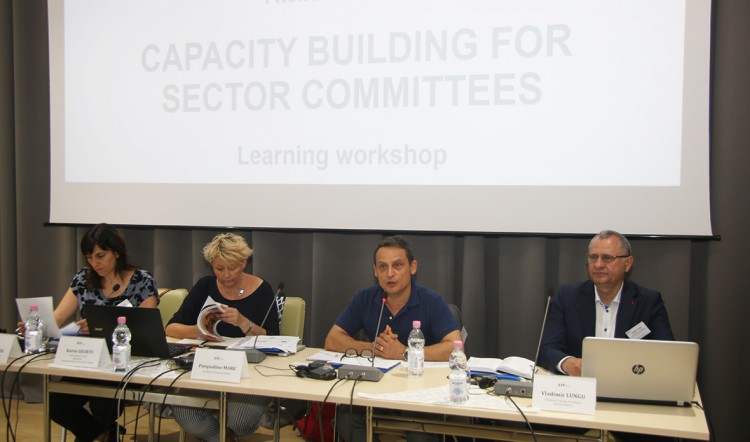Capacity building for sectoral committees to the attention of social partners and development partners
On Wednesday, June 21, in Chisinau took place a workshop on capacity building for sectoral committees in the vocational and technical system (VET) in Moldova, organized by the European Training Foundation (ETF).
The activity was attended by 35 people – representatives of the National Trade Union Confederation of Moldova (CNSM), the National Confederation of Employers of the Republic of Moldova, the Ministry of Labour, Social Protection and Family and the Ministry of Education, international experts from the ETF, the International Labor Organization (ILO), LED Liechtenstein, MBO Raad in the Netherlands.
“We come with support and we teach those who deal with the given field, guiding them how to make these structures effective. We also bring the example of the Netherlands in this respect, because it is probably the most appropriate country, which has already established sectoral committees in all branches and they are very productive,” said Pascqualino Mare, ETF expert on VET governance.”
The expert pointed out that similar workshop will take place in October this year, but also next year. “We will not stop until we see that the Republic of Moldova has strong and lucrative sectoral committees,” he added.
According to Sergiu Sainciuc, vice-president of CNSM, “the fact that we do not have sectoral committees in all branches of the national economy, and that only 33 occupational standards have been developed so far, out of the more than one hundred recommended, is a major problem for us. We are also interested in the fact that those sources, currently allocated from the state budget for professional training of young people, are used efficiently based on performing programs, so that after graduation these people will be competitive. We need skilled workers, based on labour market needs, and the role of sectoral committees is to contribute to their training,” Sainciuc said.
In turn, Leonard Palii, chair of the Sectoral Committee on Agriculture and Food Industry, said that the 6 sectoral committees formed so far in the areas of construction, agriculture and food, information and communication, transport and road infrastructure, trade, light industry , are few and relatively effective. “That’s why we need to gather and discuss this issue. We have two tasks ahead – to strengthen the capacity of existing committees and expand their creation in other branches. The main problem is that the labour market has not realized the necessity and benefits of involvement in the process,” he said.
Ala Lipciu, ILO National Coordinator in Moldova, reiterated that sectoral committees are a vital tool to approach labour market demand and offer by improving the education and training system and improving qualifications. “One of the mandates of the sectoral committees is the development of well-integrated occupational standards in labour market needs that would not only facilitate the required qualifications but also the transition of young people from school to the first job,” she stressed.
The workshop presented the experience of the Netherlands in the field, where sectoral committees have a special role in the elaboration of occupational standards.
At the same time, the participants were organized in 3 working sub-groups, which made proposals for a sectoral report in Moldova.
The European Training Foundation (ETF) is a decentralized agency of the European Union based in Turin, Italy, whose mission is to help transition and developing countries to exploit the potential of their human capital by reforming their education, training and education systems and of the labour market in the context of the EU’s external policy.
As part of its work on VET governance, the ETF has supported the Republic of Moldova in identifying areas for improving the performance of sectoral committees.



